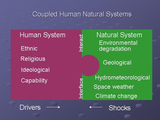Last month Dr. Bulmer from JCET was invited to
give two presentations. The first was at the Sixth Spatial Socio-Cultural
Knowledge Workshop which was held at the Defense Academy Shrivenham. The focus
of the workshop was on Human Geography for Decision Support and Dr Bulmer gave
a paper entitled “Civil Military Operations: The increasing necessity for
Geo-inputs in planning and response”. Attending the workshop were a wide
stakeholder group, including Defence and non-Defence departments of state and
NGOs. The aim was to develop an integrated view on seven different, but related
objectives connected with human geography for decision support. The second was
at the Tenth International Conference on Military Geosciences: Rebellions and
Military Reactions held in Aviemore. Dr. Bulmer gave the Keynote speech entitled
“Geo-inputs in Civil Military Planning and Response”. He highlighted that Earth
in the 21st Century is marked with societies ravaged by, or at
significant risk of, conflicts, disasters, environmental emergencies, and
humanitarian catastrophes. In the last decades, national and foreign militaries
have been involved in emergency and disaster response, reconstruction and
development roles, often as part of counter insurgency operations,
peace-keeping and peace support operations. Dr. Bulmer proposed that the 21st
Century strategic environment is increasingly best described using the concept
of coupled human natural systems. A myriad of ethnic, religious, ideological
and capability drivers create the human systems that interface and interact
with the natural system. The human system is increasingly being shocked by
environmental degradation, geological, hydrometeorological, space weather
events and climate change. Around the world, increasing evidence that climate
change is altering the interfaces and interactions that link human to natural
sub-systems is being recognized in civil and military policies and strategies. Dr. Bulmer is of the opinion that this requires a renewed emphasis in civil
military planning on identifying naturally induced drivers of conflict,
disasters and humanitarian catastrophes. Where possible, the aim is to prevent
them by understanding factors such as their frequency, duration and magnitude.
Such understanding of the physical environment requires geo-eco-bio-physical
and related technical knowledge collectively described as geo-inputs. These
inputs are especially important to civil military planners and responders when
considering the duration of future military conflicts, responses to disasters
and humanitarian catastrophes. If the desired end-state is to be attained then
the effects of climate change on the coupled human natural systems in the
geographical area of operations, must be identified and appropriately informed
responses implemented. Click here for the full image.
Posted: July 11, 2013, 11:53 AM
